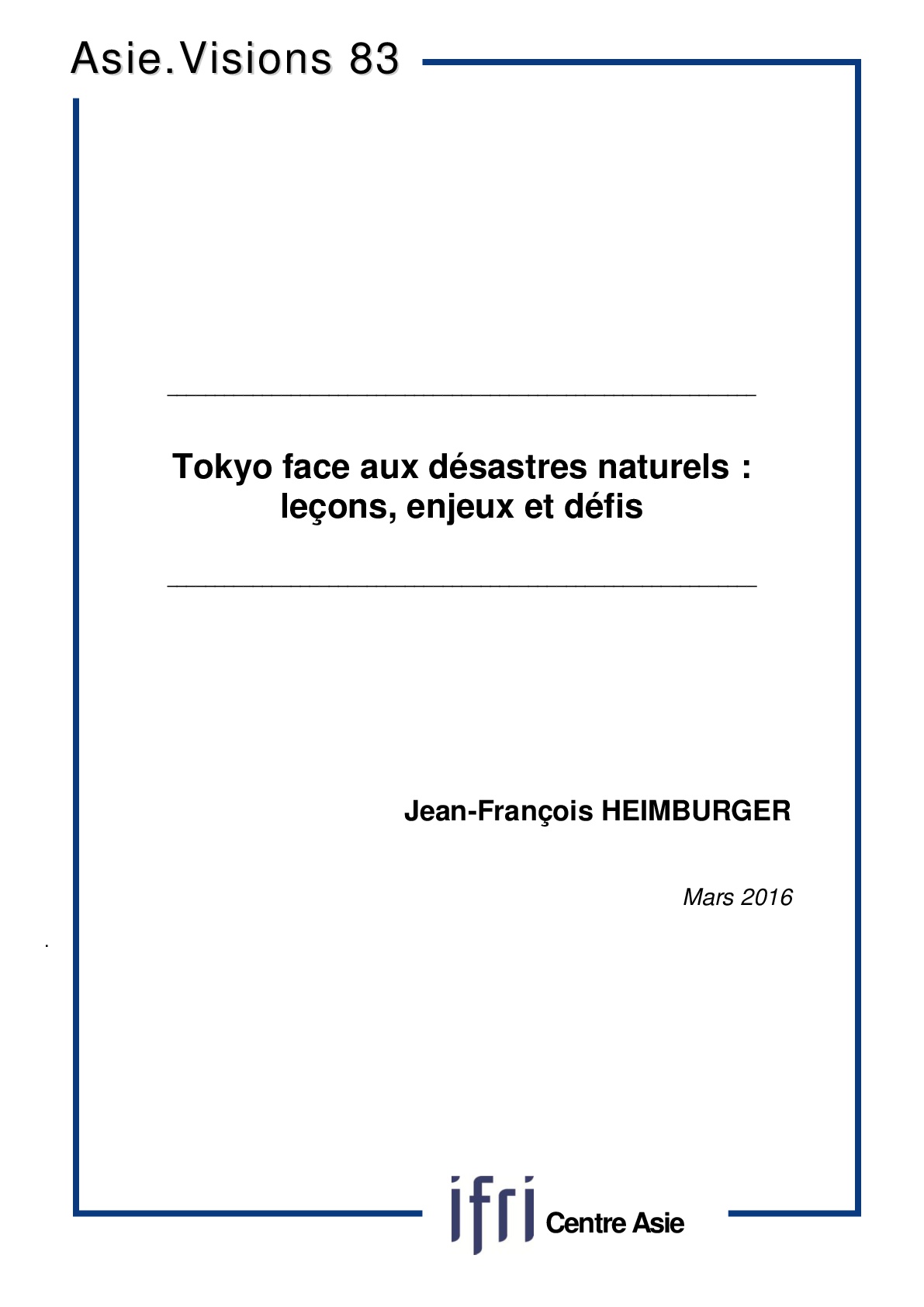Tokyo face aux désastres naturels : leçons, enjeux et défis

While Tokyo prepares to welcome the 2020 Summer Olympic Games, the likelihood that a massive earthquake will occur in the capital city within the next thirty years is estimated at 70 %. This fact alone reflects the challenges that Japan must face in managing the risk of natural disasters.

The economic heart of Japan with a population of 13.5 million, Tokyo is particularly vulnerable to violent earthquakes and storms. In order to prevent these natural risks from turning into disasters, Japan relies on lessons learned from past disasters, and in particular past failures, in order to improve its risk prevention and management systems.
Following earthquakes in 1923 in Tokyo, 1995 in Kobe and 2011 in the Tohoku, weaknesses were found at various levels: insufficiently resistant infrastructure, ineffective rescue services, inadequate public information and weak social ties.
The country, and collectivities such as Tokyo, bounced back by strengthening their legal arsenals and increasing budgets for disaster prevention. Monitoring and forecasting systems have been improved and buildings strengthened. Rescue services have been upgraded and public information has been intensified. Consequently, Japan is now internationally recognized as a model in terms of prevention and disaster response capacities.
Nonetheless, in the short and medium terms, authorities in Tokyo and elsewhere in Japan must still overcome a number of challenges. A first set relates to infrastructure: the proportion of vulnerable buildings needs to be decreased and fail safes to cut electricity generalized in order to avoid widespread fires following major earthquakes. Additionally, escape plans and public awareness systems need to be improved, which would reduce the number of potential victims in case of flood. A comprehensive approach is also essential, one that integrates more vulnerable populations such as seniors or disabled persons (who respectively account for 22 % and 4.5 % of Tokyo’s population), but also foreign residents, tourists and the homeless. Furthermore, some dangers (high winds, volcanic eruptions, and heat waves) are not always addressed because of their low likelihood or a lack of appropriate means, whereas their impact on society could be significant. Finally, in view of problems observed during the reconstruction phase after the earthquakes in 1995 and 2011 (precarious living conditions, case of solitary deaths), it is necessary to better anticipate post-disaster challenges in order to limit secondary victims.
The scale of future disasters will in part depend on the anticipation of authorities as well as citizens and on their ability to pursue and intensify their preparation efforts before disaster strikes.
Related centers and programs
Discover our other research centers and programsFind out more
Discover all our analyses
Opening up the G7 to South Korea to Address Contemporary Global Challenges
The G7’s global influence has diminished as powers like China reshape international governance through initiatives such as BRICS and the Shanghai Cooperation Organisation (SCO). With the G7 now representing just 10 per cent of the world’s population and 28 per cent of global GDP, its relevance is increasingly questioned.
Expanding SPDMM as a pivotal institution in the Pacific – A French perspective
The South Pacific Defence Ministers’ Meeting (SPDMM) is the only forum that brings together defense ministers from the wider South Pacific — including Chile, which is hosting it for the first time. This heterogeneous group of countries with varying resources, capacities, and interests — Australia, Chile, Fiji, France, New Zealand, Papua New Guinea (PNG), and Tonga — are united by their shared determination to strengthen cooperation on maritime security and humanitarian assistance and disaster relief (HADR) activities.
EU’s Derisking From China: A Daunting Task
With economic security as a major concern, the EU has recently turned to “derisking” from China. The EU strategy entails reducing critical dependencies and vulnerabilities, including in EU supply chains, and diversifying where necessary, while recognizing the importance and need to maintain open channels of communication.
Sri Lanka’s NPP Government. From System Change to Structural Compliance
In September 2024, a relative outsider to Sri Lanka’s two-party-dominated political system, Anura Kumara Dissanayake, won the presidential elections. The anti-establishment, populist movement he represented, the National People’s Power (NPP), went on to receive an overwhelming mandate in the November 2024 general elections, winning 159 seats in a 225-member parliament.









